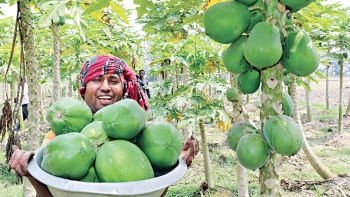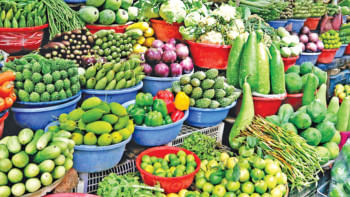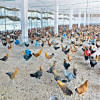Prolonged monsoon drives up vegetable, egg prices

Heavy monsoon rains have disrupted Bangladesh's agricultural supply chain, driving up prices of essential vegetables and eggs across the country over the last three months.
A report by the Bangladesh Trade and Tariff Commission (BTTC), submitted to the commerce ministry today, highlights that persistent rains could worsen food inflation in the coming weeks.
The BTTC, which reviewed market prices, supply conditions, and government interventions in its report, cites erratic weather and flooding during June, July and August as the primary cause of supply disruptions.
Md Omar Faruk, a meteorologist at the Bangladesh Meteorological Department, told The Daily Star that rainfall in August last year was 50 percent above normal, compared with just 1 percent this August.
He noted that April and May this year received adequate rainfall, unlike the near-drought conditions in the same period last year. June and July this year also saw significant rain, in contrast to lower levels last year.
July alone saw rainfall 23.5 percent above the historical average, damaging farmland and pushing prices beyond the usual seasonal increase.
As vegetable supply thinned, demand for substitutes such as eggs rose, further driving up costs, the BTTC noted.
SPIRALLING PRICES OF ESSENTIALS
Citing data from the Department of Agricultural Marketing, the commission stated that several essential food items have seen sharp increases over the past three months as of September 3.
Green chilies posted the steepest rise, up 128.57 percent to Tk 140-Tk 180 per kilogramme (kg). Okra rose 75 percent to Tk 60-Tk 80 per kg, while brinjal increased 16.7 percent to the same range.
Local onion prices surged 45.45 percent, reaching Tk 75-Tk 85 per kg, and pointed gourd climbed 44.44 percent to Tk 60-Tk 70 per kg. Egg prices increased 6.25 percent to Tk 10-Tk 11.25 per piece.
Potatoes remained relatively stable, rising just 4.44 percent to Tk 22-Tk 25 per kg, while green papaya dropped 37.5 percent due to stable production and limited demand. Teasel gourd also fell 29.17 percent, now priced at Tk 65-Tk 90 per kg.
Besides, there is a significant gap between the production cost and the final retail price of vegetables, stated the commission, suggesting that enhanced monitoring of the supply chain could help reduce prices.
Green chilies, which are not grown locally during the monsoon, present a particular challenge, the commission observed. High import duties, 58.6 percent in total, along with a fixed dutiable value of $0.50 per kg, have contributed to price increases.
At this valuation, the government earns about Tk 36 per kg, effectively maintaining high tariffs despite consumer hardship.
To rein in the spiralling prices of green chilies, the BTTC advised scrapping the 20 percent supplementary duty and replacing the fixed minimum import price with actual transaction values at least until September 30, 2025, to lower costs and stabilise the market.'
The commission noted that potato and onion supplies have held up thanks to record domestic harvests and relaxed import policies. The agency, however, warned that further rainfall could destabilise this balance.
Bangladesh produced 1.15 crore tonnes of potatoes in the last harvesting season, the highest in history. The interim government has procured 50,000 tonnes to safeguard farmers amid falling market prices.
Onion production reached 44.48 lakh tonnes in FY2024-25.
The BTTC recommends that if onion prices exceed Tk 90 per kg or eggs rise above Tk 150 per dozen, imports should be allowed with temporary suspension of duties.
The report also points out that current prices of potatoes, onions, and eggs are still lower than the thresholds at which the government had previously allowed imports and granted tariff exemptions.
Meanwhile, traders said that in a rare moment of relief last August, when the student-led mass uprising ousted the Awami League-led government, markets briefly experienced fewer instances of extortion and transport bottlenecks, which led to a decline in prices.
That calm has since evaporated, leading to further pressure on prices, they added.

 For all latest news, follow The Daily Star's Google News channel.
For all latest news, follow The Daily Star's Google News channel. 










Comments